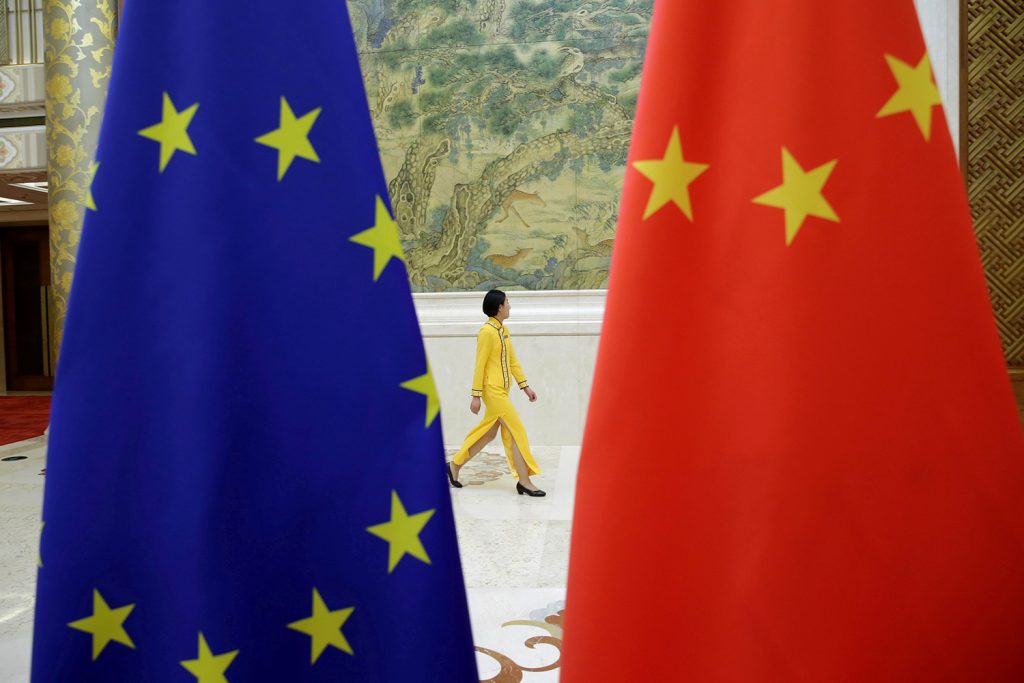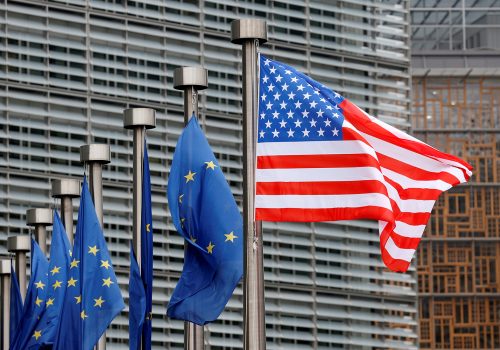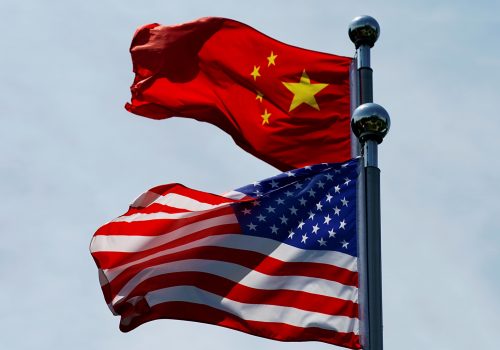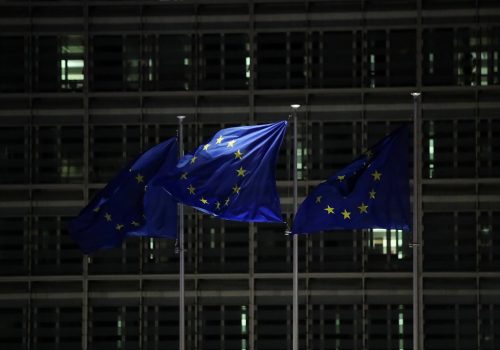After seven years of negotiation, the European Union (EU) and China have reportedly reached an agreement in principle on the Comprehensive Agreement on Investment (CAI)—and they’ve pledged to finalize it by the end of the year. If signed, the CAI represents another major achievement for China in carving out an economic space for itself in the face of acrimonious contention with the United States, following last month’s signing of the Regional Comprehensive Economic Partnership (RCEP) with other Asian nations.
For the EU, the reported deal seems to meet some of its demands for more market access in China. However, the “comprehensive” investment deal appears to be upstaging the substantive consultation in the soon-to-be-revived US-EU partnership, supposedly to coordinate policies in dealing with China’s challenges—something both sides of the Atlantic have signaled in recent weeks.
The EU began to negotiate the CAI with China in 2013 to address major asymmetries in investment relationships between the two sides that favor China, in a sign that the 1985 EU-China Agreement on Trade and Economic Cooperation and the twenty-five bilateral investment treaties (BITs) between China and individual EU member states had become inadequate. By engaging in these negotiations, the EU has aimed to rectify asymmetry in three important areas: market access; level playing fields and non-discriminatory treatment; and respect for international environmental and labor standards—the same set of problems the United States has also tried to address with China.
In terms of market access, Chinese companies have long enjoyed open access to the EU; meanwhile, EU companies working in China continue to face one of the most restrictive foreign direct investment regimes, according to the Organization for Economic Cooperation and Development (OECD). The regime’s restrictions include a long list of economic sectors closed to foreigners. The list has recently been shortened to thirty-three sectors, slightly down from last year’s forty sectors, and still includes sectors like broadcasting, public polling, online news services, and education. Furthermore, EU companies seeking to operate in China have to navigate cumbersome legal and regulatory obstacles. One of the more contested rules is the cap on foreign ownership of companies with foreign investment. Recently, China has removed foreign-ownership caps in the asset management, securities and futures brokerages, and life insurance sectors, but Chinese majority ownership is still required for sectors such as telecom services, airlines, and nuclear-electricity plants.
Once established in China, EU companies have been confronted with an uneven playing field and discrimination from China, whereas in contrast, Chinese companies in the EU enjoy a level playing field under non-discriminatory and competitive-neutrality principles enshrined in EU laws. The uneven playing field for EU companies in China is rooted in the nature of China’s economic system, which is based on state guidance and support for domestic companies, both state-owned and privately-owned. State support for Chinese companies is pervasive, going well beyond the World Trade Organization’s (WTO) definition of industrial subsidies like tax concessions or credits, to encompass various forms of government support including land-use rights, access to favorable financing, preferential tax and regulatory treatment, mandates to purchase specific products such as solar panels or electric vehicles, and other beneficial treatment by local governments.
China’s discriminatory treatment is also enshrined in law, which differentiates between rules for foreign-invested companies, domestic private companies, and domestic state-owned companies—clearly favoring the state-owned companies. China’s Foreign Investment Law (2019)—meant to update the legal framework for foreign-invested companies—bans forced transfers of technology, strengthens the protection of intellectual property, and promises equal treatment of foreign-invested companies even though their differentiated standing in law is left unchanged. It remains to be seen whether those provisions will bring any meaningful change.
More importantly, other recent laws have caused problems for foreign-invested companies. The National Intelligence Law (2017) requires Chinese companies to share intelligence with the Chinese authorities, the Company Law (2018) mandates the establishment of Communist Party of China cells inside companies to perform “guiding functions,” and the just-launched corporate social-credit system monitors and steers corporate behavior. Theoretically, these new laws are binding for foreign-invested companies operating in China under the concept of national treatment, something the EU also wants China to respect in normal circumstances. But under these laws, foreign-invested companies operating in China may have to deal with very alien and onerous legal requirements, which are non-existent and unthinkable in the EU and the West more broadly.
Finally, while China has committed to climate standards by declaring its adherence to the Paris Climate Agreement and pledging to be carbon neutral by 2060, it has not made the same commitment to global labor standards; the EU may have more difficulty getting China to fully embrace International Labor Organization (ILO) conventions, in particular the right to organize labor unions, the right to collectively bargain, and the prohibition of all forms of forced labor.
According to press reports, the breakthroughs paving the way for the EU-China agreement in principle seem to involve major concessions from China to open to EU companies sectors including manufacturing, financial services, real estate, construction, and auxiliary services to support shipping and air transport. By doing so, China is securing rights to participate in the EU energy and renewable energy sector. To date, it is not clear if any progress has been made on other key EU concerns, the most important and difficult of which is getting an even playing field in China. In any event, it is important to note that if the EU were to finalize the CAI mainly because it has obtained more market access to China, without securing meaningful agreements on level playing fields, discriminatory treatment, and labor standards, the deal may not be “worth having,” as one European Commission spokesperson stated, promising that “we will not put speed over substance.”
Regardless of the final details of the CAI, the timing of its agreement in principle, just weeks before the inauguration of President-elect Joe Biden, is problematic. The CAI together with the EU’s proposed Digital Services Law and Digital Markets Law and the planned implementation of digital-services taxes in several European countries represent definitive steps taken by the EU in crucial issues like dealing with China and setting regulations and standards in the digital economy. These steps could preempt close consultation between the US and EU, which are expected to develop joint approaches to address these important problems. The heralded revival of the transatlantic alliance could run into a rocky path before it starts.
For China, finalizing the CAI after July’s geographical-indications agreement with the European Union represents a major step forward in securing stable economic relations with the EU—China’s second-largest trading partner with two-way trade amounting to $650 billion, behind only the Association of Southeast Asian Nations (ASEAN) and just ahead of the United States. This deal could also help China cope with the EU’s strategic-rebalancing effort, which is expected to become more critical of China’s human-rights violations.
In addition to the CAI, the RCEP and China’s growing trade and investment relationships with developing countries—especially those carried out under the Belt and Road Initiative (BRI) umbrella—have constituted a vast and viable economic living space for China. This has also enabled China to build up political influence and support, especially among developing countries, as it faces protracted strategic contention with the United States and the West in general.
Hung Tran is a nonresident senior fellow at the Atlantic Council, former Executive Managing Director at the Institute of International Finance, and former Deputy Director at the International Monetary Fund.
Further reading
Image: REUTERS/Jason Lee



